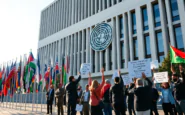Topics Covered
The U.S. State Department has decided to deny visas to Palestinian officials wishing to attend the 80th session of the United Nations General Assembly in New York. This decision, which excludes representatives of an already marginalized people, is seen as a further attempt to silence the Palestinian voice on the international stage.
But what does this really mean for the global community?
The implications of the American decision
Denying visas to Palestinian officials represents a setback in an already complex context of political isolation. Historically, the United States has respected its headquarters agreement with the UN, which provides for the granting of visas to foreign officials. However, there have been times when Washington has exploited its role as host to deny entry to diplomats from countries deemed inconvenient. This is not a new phenomenon: in 1988, for example, Yasser Arafat was excluded from the General Assembly. Today, US authorities justify visa denials with alleged national security interests. But we ask: is it really a security issue or is there more to it?
The Trump administration claims the decision is based on the Palestinian Authority's failure to live up to its commitments and undermining the prospects for peace. However, this claim deserves to be challenged. Under Mahmoud Abbas's leadership, the PA has repeatedly condemned terrorism and supported Hamas disarmament efforts. Isn't it time to reconsider these judgments?
The geopolitical context and the recognition of Palestine
The American refusal comes at a crucial time, as several Western countries are considering recognizing Palestine at the UN. Nations such as France, Canada, the United Kingdom, Australia, Portugal, and Malta are expected to join the 147 other UN members who already recognize Palestinian statehood. The United States, concerned that these declarations could gain momentum, is trying to deny Palestinians the opportunity to express their grievances and celebrate potential recognition. But what will happen if the international community decides to listen?
Meanwhile, Israeli Prime Minister Benjamin Netanyahu will be warmly welcomed to the General Assembly, despite the International Criminal Court's issuance of an arrest warrant. This contrast highlights the disparities in the treatment of political leaders on the international stage. How can all this be justified?
The silence imposed on the Palestinians
The decision to deny visas to Palestinian officials comes at a time when violence against Palestinian journalists is reaching alarming levels. Just a few days ago, an Israeli airstrike on a hospital in Gaza killed several journalists. The United States failed to condemn the attack, highlighting its tacit complicity in silencing Palestinian voices. This is not an isolated case; recent history is marked by attacks on journalists, including the brutal murder of journalist Shireen Abu Aqleh. How can we accept this?
The visa denial is part of a long series of actions aimed at silencing any voice critical of Israeli policy. Matt Duss, an expert on international politics, summed up this situation by stating that the denial is "a perfect expression of decades of US policy toward the Palestinians." If not even a Palestinian entity that has renounced violence can make itself heard, who can truly represent the Palestinians?
The current US position appears to benefit Israeli efforts to marginalize Palestinians, seeking to erase their self-determination. However, despite pressure, the Palestinian voice cannot be silenced. The struggle for recognition and justice continues and cannot be ignored by the international community. It's time to reflect: can we really remain silent in the face of all this?

